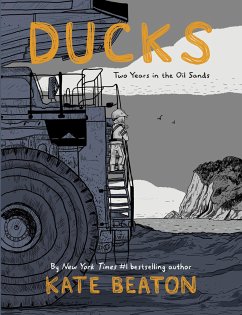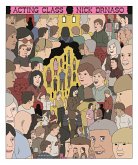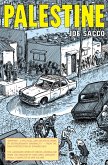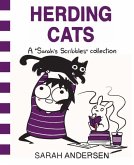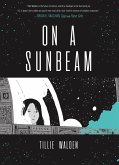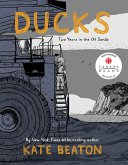*WINNER OF THE EISNER AWARDS FOR BEST MEMOIR AND BEST WRITER/ARTIST* 'A vast and complex tapestry that captures the humanity of people... it shimmers with grace' ALISON BECHDEL, author of FUN HOME Before there was Kate Beaton, New York Times bestselling cartoonist of Hark A Vagrant, there was Katie Beaton of the Cape Breton Beatons, a tight-knit seaside community. After university, Katie heads out west to take advantage of Alberta's oil rush, part of the long tradition of East Coast Canadians who seek gainful employment elsewhere when they can't find it in the homeland they love so much. With the singular goal of paying off her student loans, what the journey will actually cost Katie will be far more than she anticipates. Arriving in Fort McMurray, Katie finds work in the lucrative camps owned and operated by the world's largest oil companies. As one of the few women among thousands of men, the culture shock is palpable. It does not hit home until she moves to a spartan, isolated worksite for higher pay. Katie encounters the harsh reality of life in the oil sands where trauma is an everyday occurrence yet never discussed. For young Katie, her wounds may never heal. Beaton's natural cartooning prowess is on full display as she draws colossal machinery and mammoth vehicles set against a sublime Albertan backdrop of wildlife, Northern Lights, and Rocky Mountains. Her first full length graphic narrative, Ducks: Two Years in the Oil Sands is an untold story of Canada: a country that prides itself on its egalitarian ethos and natural beauty while simultaneously exploiting both the riches of its land and the humanity of its people.

In ihrem Comic „Ducks“ erzählt Kate Beaton vom harten Alltag auf Kanadas Erdölfeldern – und wie der Sexismus dort und die Naturzerstörung zusammengehören
Ihre Kollegen nennen sie „Schätzchen“, „junge Dame“, „Baby“ oder „Süßes“. Katie ist 21, als sie in den Ölsanden anheuert, den Fracking-Camps im kanadischen Alberta, wo in riesigen Minen Öl aus dem Sand gepresst wird. Die Arbeit wird gut bezahlt, und Katie muss den Kredit abstottern, den sie für ihr Geschichts- und Anthropologiestudium aufgenommen hat. Aber es ist ein harter Job in einer unwirtlichen Gegend, die Arbeiter leben abgekapselt in Camps, es sind Orte mit eigenen Regeln. Eine Männerwelt - an Katies erstem Tag stehen die Kollegen Schlange, einmal rund um die Werkzeugbutze, in der sie arbeitet, unter dem Vorwand Schraubenschlüssel oder anderen Kleinkram zu brauchen, tatsächlich um das neue Mädchen abzuchecken. Kommentare zu ihrem Körper inklusive.
Die kanadische Zeichnerin Kate Beaton hat das alles so oder so ähnlich erlebt. Mehr als zwei Jahre arbeitete sie für verschiedene Firmen in den Minen und hat ihre teilweise traumatischen Erlebnisse auf über 400 Seiten festgehalten. Ihr graphic memoir „Ducks. Zwei Jahre in den Ölsanden“ beschreibt die schmutzigen Geschäfte des Kapitalismus, aus dem Inneren der Ausbeutungsmaschine. Es ist ein Bericht, der Sexismus, die miesen Lebensbedingungen der Arbeiter, die Gewalt gegenüber der indigenen Bevölkerung und die Plünderung der Umwelt zusammendenkt. In den USA wurde das Buch bereits in diverse Bestenlisten gewählt, unter anderem hat Barack Obama „Ducks“ in seine jährlichen Leseempfehlungen aufgenommen.
Katies Anstellungen in immer abgelegeneren Camps sind eine Reise ins Herz der Finsternis toxischer Männlichkeit. Bei dummen Witzen und anzüglichen Sprüchen bleibt es nicht. Die Isolation in den Camps und der Männerüberschuss (50:1!) schaffen ein Klima, in dem Machtmissbrauch bis hin zu sexueller Gewalt an der Tagesordnung ist. Als Katie einmal eine Party besucht und mit einem der Männer in dessen Zimmer geht, um eine Flasche Wodka zu holen, vergewaltigt er sie – Kate Beaton deutet es in vier gänzlich schwarzen, untereinander stehenden Panels an. Die mit ihr befreundeten männlichen Kollegen nehmen den Vorfall nicht ernst, lachen nur, als Katie davon erzählt – weil sie betrunken war, als es passierte. Die wenigen Frauen, denen Katie sich anvertraut, erzählen ihr dann ähnliche Geschichten. Und als Katie sich bei ihrem Vorgesetzten über die Belästigungen beschwert, meint der nur, sie habe schließlich gewusst, worauf sie sich eingelassen habe. Das ist nicht mehr nur toxische Männlichkeit, „Ducks“ beschreibt – sehr genau – die Strukturen eines vergifteten Systems. Vergleiche mit den Strukturen in der Pop-Industrie, dem Machtmissbrauch, wie er derzeit von diversen Frauen etwa Till Lindemann und seiner Band Rammstein vorgeworfen wird, drängen sich auf.
Sich selbst zeichnet Kate Beaton als sehr junge, verschüchterte Frau, die Augen klein hinter ihrer Schutzbrille, die Haare halblang unter einem Helm. In dezent blaugrau kolorierten Panels ist ihr Alltag zu sehen, alte E-Mails und Gespräche mit Ex-Kollegen hatten der Zeichnerin geholfen, sich zu erinnern. Die vielen kleinen Kästchen, in denen die Figuren agieren, entsprechen der Enge in den Camps, wo Katie den Kollegen nicht aus dem Weg gehen kann. Die Beziehungen zu ihnen sind dadurch gleichzeitig intensiv und flüchtig, mit jedem Wechsel der Arbeitsstätte tauchen neue Gesichter auf. Nur selten öffnet sich der Blick – etwa auf die riesigen Industrieanlagen, die wie von Aliens abgeworfen als gigantische Fremdkörper in der Landschaft liegen. In solchen Bildern zeigt die Zeichnerin Kate Beaton, was sie kann.
Dass es nicht irgendein fernes Schwellenland ist, in dem Bagger Riesenkrater in den Sand fressen, Industrieabwässer die Flüsse vergiften und Arbeiter unter miesen Bedingungen schuften, sondern Kanada, das Land der Wälder, Seen und Büffel, macht den Bericht zusätzlich brisant. Büffel gibt es in einem der Camps dann tatsächlich zu sehen, eine ganze Herde sogar. „Die haben sie auf das zurückgewonnene Grubengelände gestellt, so ’ne Firmensache“, heißt es. Die ausgepresste Natur wird eingehegt und ausgestellt wie ein Schmuckstück. Ein von Beaton wunderschön gezeichneter Büffel wirkt ebenso naturalistisch wie surreal. Ebenso wie ein Fuchs, der während einer Nachtschicht vor Katie auftaucht wie eine Erscheinung. Er hat nur drei Beine, und Katie scheucht ihn weg. Viel zu gefährlich sei es im Camp für ihn, sagt sie, er wolle doch nicht noch ein weiteres Bein verlieren.
Auch unter den Arbeitern gibt es immer wieder Unfälle, Witze über drohende Krebserkrankungen durch die schlechte Luft sind üblich. Die Arbeit in den Ölsanden ist buchstäblich vergiftet – und trotz allem, was sie erlebt hat, hat die Autorin viel Mitgefühl mit den Männern, die hier ihren Lebensunterhalt verdienen. Sie sind gefangen in den dreckigen Jobs dieser Ölindustrie – wie die Enten, auf die der Titel des Buches anspielt. Ganze Schwärme stecken im ölverseuchten Abwasser fest. Sie verenden im schwarzen Matsch.
MARTINA KNOBEN
Sie wird angeglotzt, hört blöde Sprüche, erlebt sexuelle Gewalt: Katie (rechts) im Fracking-Camp.
Foto: Reprodukt/Zwerchfell
DIZdigital: Alle Rechte vorbehalten – Süddeutsche Zeitung GmbH, München
Jegliche Veröffentlichung und nicht-private Nutzung exklusiv über www.sz-content.de
Barack Obama's Favourite Books of 2022
New York Times Notable Book of 2022
New Yorker, Time, and Washington Post Best Book of 2022
Publishers Weekly Top Ten Book of 2022
"Complex and unforgettable."-TIME Top 100 Books of the Year
"The stories in this illustrated memoir are as gritty and harrowing as you might expect, but there's humor here, too, as well as compassion and tenderness."-New York Times 100 Notable Books of 2022
"A monumental synthesis of history, politics, and herself... Ducks weaves Beaton's own experiences with warm, humane portraits of the many people she met on the oil sands... 55,000 square miles [that are] a controversial locus of the Canadian economy, culture, and politics, a byword for both prosperity and environmental destruction."-Kathryn VanArendonk, Vulture
"What a difficult, gorgeous and abidingly humane book."-Rachel Cooke, The Guardian
"Epic. Kate Beaton headed west [to] one of the world's most environmentally destructive oil operations, where workers lived in barracks-like camps and men vastly outnumbered women. Her experience there... gave her an insider's view into a place and piece of Canadian history few outsiders ever see."-Robert Ito, New York Times
"A serious, moving, and heartfelt piece of cartooning that is as kind as it is fearless. Easily one of the most impressive graphic novels of this year, or works of any kind in the past decade."-Graeme McMillan, Wired
"[Ducks] blends her trademark wry humor with sharp social critique and raw personal experience."-Dan Kois, Slate
"An exceptionally beautiful book about loneliness, labor, and survival. Beaton is a thoughtful guide through a complex landscape of class and gender, and these pages ache with grief and grace."-Carmen Maria Machado, In the Dream House
"A masterpiece, a heartbreak, a nightlight shining in the dark."-Patricia Lockwood, No One Is Talking About This
"Powerful and brilliant, this is easily the best graphic work I've read this year."-Margaret Kingsbury, Buzzfeed Books
"Kate Beaton's exceptionally well-told and well-drawn graphic memoir... full of insights into human and environmental degradation, make[s] her a memoirist of the first rank."-Bethanne Patrick, Los Angeles Times
"Candid and unflinching."-Karla Strand, Ms Magazine
"Beaton left Nova Scotia's Cape Breton at age 21 for an oil boom spurting a wealth of high-paying jobs that she could use to pay off her student loans. The place she finds is full of life and also hostile to it; a cabdriver warns her that a "shadow population" of workers "live here, but they don't live here." As Beaton settles into daily life in a tool shop, she begins to understand how that transience changes people, as well as her own complicity in the wholesale destruction of Indigenous land."-Emma Alpern, Vulture
"In this hefty, sublime graphic novel/memoir, Beaton invites readers into a lonely, alien world just outside our own."-Patrick Rapa, Philadelphia Inquirer
"What makes this the kind of book that you can't stop thinking about is the empathy with which Beaton sees the world."-Dustin Nelson, Thrillist
"Inside this dreary situation, she somehow finds humanity and even humor. It took Beaton about two years in the oil sands to pay down her loans; processing the experience took longer."-Cat Auer, AV Club
"Ducks is both a coming-of-age narrative and a skillful, subtle commentary on class, misogyny, and the human costs of environmental extraction. From the oil fields to the hallways of worker housing, Kate Beaton's comics are rich with quiet revelations, intimate details, and a deadpan, devastating sense of humor. A generous and illuminating book; I suspect it will stay on my mind for a very long time."-Anna Wiener, Uncanny Valley
"In Ducks, Kate Beaton doesn't tell us how capitalism extracts, exploits, commodifies, and alienates. Nor does she show us. She recreates life in an oil sands mining operation in granular detail and allows us to make the connections ourselves-as she had to when she showed up to work there at age twenty-one. The effect is devastating. Despite the brutal toll Beaton suffered personally, she has woven from her experience a vast and complex tapestry that captures the humanity of people doing a kind of "dirty work" in which we are all complicit, and it shimmers with grace."-Alison Bechdel, Fun Home
"Ducks is an unforgettable, riveting work. Kate Beaton opens the mind's eye, allowing us to inhabit landscapes and experiences crucial to our time, yet largely unseen. Artful, considered and courageous, Ducks is a landmark work."-Madeleine Thien, Do Not Say We Have Nothing
"Ducks delivers an immersive, harrowing journey through an industry where the lure of fast money belies darker realities of casual brutality, profound loneliness and soul-cracking isolation. The uneasy echoes of Beaton's story ring well past the the final page. Shattering."-Jessica Bruder, Nomadland: Surviving America in the Twenty-First Century
"Katie Beaton's graphic memoir about working in the oil sands of Alberta shares an experience that feels both alien and universal, desperate and yet somehow hopeful. Frame by frame, it weaves together a complex tale about capitalism, environmental degradation, misogyny, Indigenous rights, and the lengths that some people have to go to for a fighting chance at a good life. Honest, compassionate, and clear-eyed, Ducks is a stunning achievement in storytelling that I will be thinking about for a long time."-Jung Yun, O Beautiful
"Beaton's graphic memoir of her time working in the oil patch is a vital and revelatory Canadian story, vividly told. The staggering scope of the industry and its notoriously harsh impact on the landscape of northern Alberta provide a loud, lurid backdrop. But this is fundamentally a deeply personal story, and Beaton unveils her experiences in this tough and relentlessly misogynistic work environment with a fair but unflinching eye, telling hard truths about the very mixed blessings of living and working in a boomtown."-Chris Turner, The Patch: The People, Pipelines, and Politics of the Oil Sands
"A masterpiece graphic memoir [that] makes a shattering statement on the costs of ignorance and neglect endemic in the fuel industry, in both powerful discussions of its sociopolitical ramifications and her own keenly observed personal story."-Publishers Weekly, Starred Review
"A fascinating, harrowing, unforgettable book about a place few outsiders can comprehend."-Kirkus, Starred Review
"This is graphic memoir at its finest."-Booklist, Starred Review
"An unflinchingly honest coming-of-age memoir and unforgettable depiction of capitalism's dehumanizing effect on the individual." - Library Journal
New York Times Notable Book of 2022
New Yorker, Time, and Washington Post Best Book of 2022
Publishers Weekly Top Ten Book of 2022
"Complex and unforgettable."-TIME Top 100 Books of the Year
"The stories in this illustrated memoir are as gritty and harrowing as you might expect, but there's humor here, too, as well as compassion and tenderness."-New York Times 100 Notable Books of 2022
"A monumental synthesis of history, politics, and herself... Ducks weaves Beaton's own experiences with warm, humane portraits of the many people she met on the oil sands... 55,000 square miles [that are] a controversial locus of the Canadian economy, culture, and politics, a byword for both prosperity and environmental destruction."-Kathryn VanArendonk, Vulture
"What a difficult, gorgeous and abidingly humane book."-Rachel Cooke, The Guardian
"Epic. Kate Beaton headed west [to] one of the world's most environmentally destructive oil operations, where workers lived in barracks-like camps and men vastly outnumbered women. Her experience there... gave her an insider's view into a place and piece of Canadian history few outsiders ever see."-Robert Ito, New York Times
"A serious, moving, and heartfelt piece of cartooning that is as kind as it is fearless. Easily one of the most impressive graphic novels of this year, or works of any kind in the past decade."-Graeme McMillan, Wired
"[Ducks] blends her trademark wry humor with sharp social critique and raw personal experience."-Dan Kois, Slate
"An exceptionally beautiful book about loneliness, labor, and survival. Beaton is a thoughtful guide through a complex landscape of class and gender, and these pages ache with grief and grace."-Carmen Maria Machado, In the Dream House
"A masterpiece, a heartbreak, a nightlight shining in the dark."-Patricia Lockwood, No One Is Talking About This
"Powerful and brilliant, this is easily the best graphic work I've read this year."-Margaret Kingsbury, Buzzfeed Books
"Kate Beaton's exceptionally well-told and well-drawn graphic memoir... full of insights into human and environmental degradation, make[s] her a memoirist of the first rank."-Bethanne Patrick, Los Angeles Times
"Candid and unflinching."-Karla Strand, Ms Magazine
"Beaton left Nova Scotia's Cape Breton at age 21 for an oil boom spurting a wealth of high-paying jobs that she could use to pay off her student loans. The place she finds is full of life and also hostile to it; a cabdriver warns her that a "shadow population" of workers "live here, but they don't live here." As Beaton settles into daily life in a tool shop, she begins to understand how that transience changes people, as well as her own complicity in the wholesale destruction of Indigenous land."-Emma Alpern, Vulture
"In this hefty, sublime graphic novel/memoir, Beaton invites readers into a lonely, alien world just outside our own."-Patrick Rapa, Philadelphia Inquirer
"What makes this the kind of book that you can't stop thinking about is the empathy with which Beaton sees the world."-Dustin Nelson, Thrillist
"Inside this dreary situation, she somehow finds humanity and even humor. It took Beaton about two years in the oil sands to pay down her loans; processing the experience took longer."-Cat Auer, AV Club
"Ducks is both a coming-of-age narrative and a skillful, subtle commentary on class, misogyny, and the human costs of environmental extraction. From the oil fields to the hallways of worker housing, Kate Beaton's comics are rich with quiet revelations, intimate details, and a deadpan, devastating sense of humor. A generous and illuminating book; I suspect it will stay on my mind for a very long time."-Anna Wiener, Uncanny Valley
"In Ducks, Kate Beaton doesn't tell us how capitalism extracts, exploits, commodifies, and alienates. Nor does she show us. She recreates life in an oil sands mining operation in granular detail and allows us to make the connections ourselves-as she had to when she showed up to work there at age twenty-one. The effect is devastating. Despite the brutal toll Beaton suffered personally, she has woven from her experience a vast and complex tapestry that captures the humanity of people doing a kind of "dirty work" in which we are all complicit, and it shimmers with grace."-Alison Bechdel, Fun Home
"Ducks is an unforgettable, riveting work. Kate Beaton opens the mind's eye, allowing us to inhabit landscapes and experiences crucial to our time, yet largely unseen. Artful, considered and courageous, Ducks is a landmark work."-Madeleine Thien, Do Not Say We Have Nothing
"Ducks delivers an immersive, harrowing journey through an industry where the lure of fast money belies darker realities of casual brutality, profound loneliness and soul-cracking isolation. The uneasy echoes of Beaton's story ring well past the the final page. Shattering."-Jessica Bruder, Nomadland: Surviving America in the Twenty-First Century
"Katie Beaton's graphic memoir about working in the oil sands of Alberta shares an experience that feels both alien and universal, desperate and yet somehow hopeful. Frame by frame, it weaves together a complex tale about capitalism, environmental degradation, misogyny, Indigenous rights, and the lengths that some people have to go to for a fighting chance at a good life. Honest, compassionate, and clear-eyed, Ducks is a stunning achievement in storytelling that I will be thinking about for a long time."-Jung Yun, O Beautiful
"Beaton's graphic memoir of her time working in the oil patch is a vital and revelatory Canadian story, vividly told. The staggering scope of the industry and its notoriously harsh impact on the landscape of northern Alberta provide a loud, lurid backdrop. But this is fundamentally a deeply personal story, and Beaton unveils her experiences in this tough and relentlessly misogynistic work environment with a fair but unflinching eye, telling hard truths about the very mixed blessings of living and working in a boomtown."-Chris Turner, The Patch: The People, Pipelines, and Politics of the Oil Sands
"A masterpiece graphic memoir [that] makes a shattering statement on the costs of ignorance and neglect endemic in the fuel industry, in both powerful discussions of its sociopolitical ramifications and her own keenly observed personal story."-Publishers Weekly, Starred Review
"A fascinating, harrowing, unforgettable book about a place few outsiders can comprehend."-Kirkus, Starred Review
"This is graphic memoir at its finest."-Booklist, Starred Review
"An unflinchingly honest coming-of-age memoir and unforgettable depiction of capitalism's dehumanizing effect on the individual." - Library Journal

